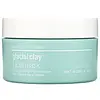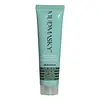What's inside
What's inside
 Key Ingredients
Key Ingredients

 Benefits
Benefits

 Concerns
Concerns

 Ingredients Side-by-side
Ingredients Side-by-side

Water
Skin ConditioningAvena Sativa Kernel Flour
AbrasiveKaolin
AbrasiveBentonite
AbsorbentGlycerin
HumectantCanadian Colloidal Clay
Skin ConditioningStearic Acid
CleansingCetearyl Alcohol
EmollientCI 77891
Cosmetic ColorantPentylene Glycol
Skin ConditioningTriethanolamine
BufferingGlyceryl Stearate Se
EmulsifyingCetyl Ethylhexanoate
EmollientMagnesium Aluminum Silicate
AbsorbentMethylparaben
PreservativePhenoxyethanol
PreservativeCI 77288
Cosmetic ColorantPropylparaben
PreservativeButylene Glycol
HumectantSaccharide Isomerate
HumectantAllantoin
Skin ConditioningXanthan Gum
EmulsifyingMelaleuca Alternifolia Leaf Oil
AntioxidantDisodium EDTA
Portulaca Oleracea Extract
Skin ConditioningWater, Avena Sativa Kernel Flour, Kaolin, Bentonite, Glycerin, Canadian Colloidal Clay, Stearic Acid, Cetearyl Alcohol, CI 77891, Pentylene Glycol, Triethanolamine, Glyceryl Stearate Se, Cetyl Ethylhexanoate, Magnesium Aluminum Silicate, Methylparaben, Phenoxyethanol, CI 77288, Propylparaben, Butylene Glycol, Saccharide Isomerate, Allantoin, Xanthan Gum, Melaleuca Alternifolia Leaf Oil, Disodium EDTA, Portulaca Oleracea Extract
Water
Skin ConditioningMontmorillonite
AbsorbentBentonite
AbsorbentMoroccan Lava Clay
AbrasiveCamellia Sinensis Callus
AntimicrobialPolysorbate 20
EmulsifyingMaris Sal
Skin ConditioningBetaine
HumectantBambusa Arundinacea Stem Extract
Skin ConditioningPhenoxyethanol
PreservativePropylene Glycol
HumectantHydrolyzed Collagen
EmollientXanthan Gum
EmulsifyingCitric Acid
BufferingAllantoin
Skin ConditioningEthylhexylglycerin
Skin ConditioningParfum
MaskingTocopheryl Acetate
AntioxidantCamellia Sinensis Leaf Extract
AntimicrobialPhenethyl Alcohol
MaskingCaprylyl Glycol
EmollientCucumis Sativus Fruit Extract
EmollientArnica Montana Flower Extract
MaskingHedera Helix Extract
AntimicrobialMalva Sylvestris Flower Extract
Skin ConditioningParietaria Officinalis Extract
EmollientSambucus Nigra Extract
Skin ConditioningWater, Montmorillonite, Bentonite, Moroccan Lava Clay, Camellia Sinensis Callus, Polysorbate 20, Maris Sal, Betaine, Bambusa Arundinacea Stem Extract, Phenoxyethanol, Propylene Glycol, Hydrolyzed Collagen, Xanthan Gum, Citric Acid, Allantoin, Ethylhexylglycerin, Parfum, Tocopheryl Acetate, Camellia Sinensis Leaf Extract, Phenethyl Alcohol, Caprylyl Glycol, Cucumis Sativus Fruit Extract, Arnica Montana Flower Extract, Hedera Helix Extract, Malva Sylvestris Flower Extract, Parietaria Officinalis Extract, Sambucus Nigra Extract
Ingredients Explained
These ingredients are found in both products.
Ingredients higher up in an ingredient list are typically present in a larger amount.
Allantoin is a soothing ingredient known for its protective and moisturizingg properties. Because of this, it is often added to products with strong active ingredients.
Studies show higher concentrations of this ingredient can promote wound healing.
Though it can be derived from the comfrey plant, allantoin is produced synthetically for cosmetic products to ensure purity.
Learn more about AllantoinBentonite is an aluminium phyllosilicate clay with great absorbent properties. The name 'bentonite' comes from the area where the largest source is found: Fort Benton, Wyoming.
As a clay, bentonite is often used to absorb excess oil and provide exfoliation. It has also been shown to have some antibacterial and anti-inflammatory properties. Studies show bentonite was effective at calming dermatitis from poison ivy and in diaper dermatitis of infants. Bentonite has also been shown to act as a barrier against toxic compounds on your skin.
Sunscreens containing bentonite display higher water resistance and stay on the skin for much longer. The sunscreens containing bentonite also show higher potency and UV light absorbtion.
Bentonite is naturally created from volcanic ash and several natural weathering/hydrothermal processes.
A common usage of bentonite is removing excess protein from white wines. Bentonite contains a property of being able to absorb large amounts of protein from aqueous solutions.
Phyllosilicate clay has a structure formed by sheets.
Learn more about BentonitePhenoxyethanol is a preservative that has germicide, antimicrobial, and aromatic properties. Studies show that phenoxyethanol can prevent microbial growth. By itself, it has a scent that is similar to that of a rose.
It's often used in formulations along with Caprylyl Glycol to preserve the shelf life of products.
Water. It's the most common cosmetic ingredient of all. You'll usually see it at the top of ingredient lists, meaning that it makes up the largest part of the product.
So why is it so popular? Water most often acts as a solvent - this means that it helps dissolve other ingredients into the formulation.
You'll also recognize water as that liquid we all need to stay alive. If you see this, drink a glass of water. Stay hydrated!
Learn more about WaterXanthan gum is used as a stabilizer and thickener within cosmetic products. It helps give products a sticky, thick feeling - preventing them from being too runny.
On the technical side of things, xanthan gum is a polysaccharide - a combination consisting of multiple sugar molecules bonded together.
Xanthan gum is a pretty common and great ingredient. It is a natural, non-toxic, non-irritating ingredient that is also commonly used in food products.
Learn more about Xanthan Gum